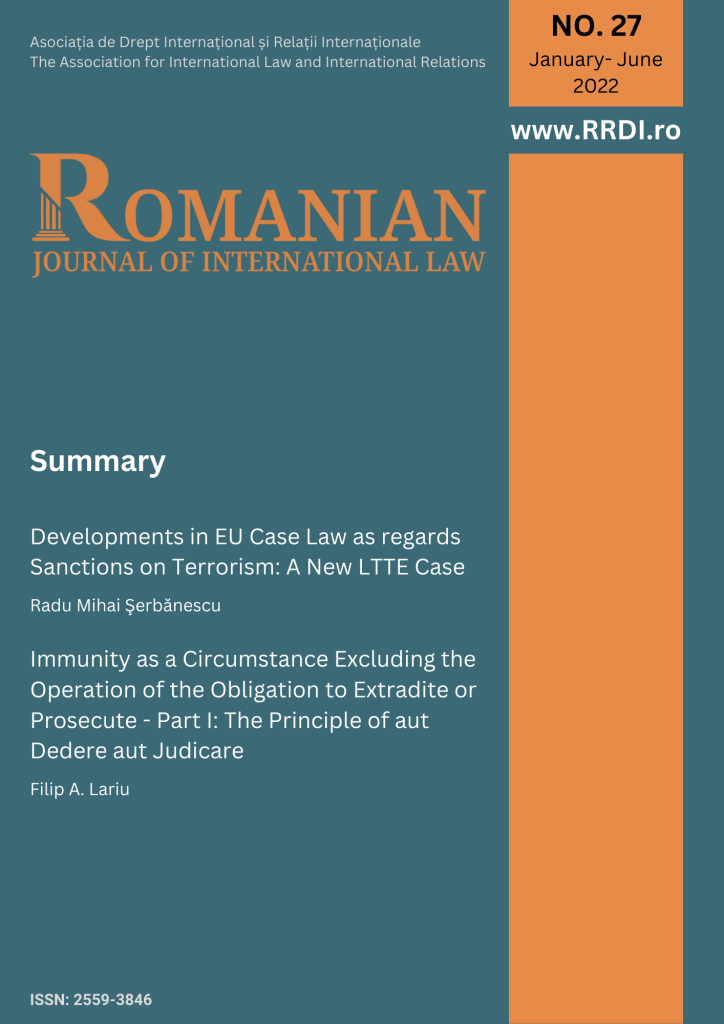Interpreting the Strategic Environmental Assessment Protocol to the Espoo Convention
Felix ZAHARIA
In 2022, the Espoo Convention Implementation Committee issued its first findings and recommendations regarding compliance with the Protocol on strategic environmental assessment, providing at the same time useful guidance for interpreting the Protocol. While the specific guidance prepared by the Committee remains to be confirmed in 2023 by the Meeting of the Parties to the Espoo Convention, it marks the Committee’s first in‑depth examination of the Protocol’s transboundary practice. The paper provides a brief analysis of the Committee’s interpretation of Article 10 of the Protocol, aimed at assisting Parties in implementing their obligations.
Compatibility of the Provisions Relating to the Protection of Investments Contained in the Energy Charter Treaty with EU Legislation (Case Study Komstroy LLC v. Republic of Moldova)
Bogdan BIRIȘ
Rodica DEACONU
On September 21, 2021, the decision of the Court of Justice of the European Union (CJEU) rendered its verdict in Komstroy v. Moldova. In this case the Court ruled that the dispute resolution mechanism provided for by the Energy Charter Treaty (TCE) [Article 26 paragraph (2) c)] cannot be applied to intra-EU disputes, as it is incompatible with European law on the matter. On the same occasion, it also found that an assignment of a claim resulting from an electricity supply contract does not constitute an “investment” within the meaning of the provisions of article 1 para. 6 and of article 26 para. 1 of the TCE.
Developments in EU Case Law as regards Sanctions on Terrorism: A New LTTE Case
Radu Mihai ŞERBĂNESCU
This paper presents and analyses the most recent judgment of the General Court of the European Union regarding certain international sanctions imposed in Brussels to combat terrorism. It goes through the rationale used by the judges to apply the standard established in 2017 by the CJEU on the review that needs to be undertaken by the Council in maintaining existing sanctions on terrorism and attempts to draw conclusions on the novelties that this judgment will bring to the work that EU Member States have to do in upcoming reviews.
Immunity as a Circumstance Excluding the Operation of the Obligation to Extradite or Prosecute – Part I: The Principle of aut Dedere aut Judicare
Filip A. LARIU
The article is the first in a trilogy that analyses the interaction between immunities of state officials and the obligation to extradite or prosecute. It focuses on the principle of aut dedere aut judicare, defining its content and scope, identifying its sources and its relationship with state jurisdiction. The doctrinal and comparative legal research employed delineates the elements and components of the obligation to extradite or prosecute in order to better outline the exact mechanism in which immunities render it inoperable. The study first finds that the obligation to extradite or prosecute comprises of just one obligation in the alternative with two elements, rather than two distinct obligations. These elements are then comprehensively dissected. The different forms taken by the principle of aut dedere aut judicare in various sources are also being considered. Lastly, the article elaborates on the grounds for- and types of jurisdiction that are to be established when fulfilling the obligation to extradite or prosecute.
A Reassessment of the Principle of Self‑Determination in the Current International Legal Framework
Bianca-Gabriela NEACȘA
During the colonial context, self-determination has been regarded as a means for colonial people to achieve independence from their foreign oppressors. However, in recent decades, international law has linked the principle of self-determination to concepts such as democracy and good governance and has reaffirmed the need to respect the principles of sovereignty and territorial integrity of States. Consequently, there has been a complete disassociating between self-determination and secession. This article addresses this shift in the paradigm of self-determination, arguing that in the post-colonial context, self-determination should be exercised solely under its internal dimension, as a right of peoples to have a representative government and to participate freely in the decision-making process of their State. It also explores the possible emergence of a remedial right to secession as an answer to the breach of the fundamental rights the people by their State.
An ISIS Tribunal – A Legitimate and Appropriate Instrument to Counter Terrorism within International Law?
Raluca-Andreea ȘOLEA
The aim of this research is to emphasize whether an ISIS Tribunal – an ad-hoc tribunal to prosecute ISIS fighters would be a legitimate and appropriate instrument to counter the terrorism phenomenon through international legal means, by also taking into consideration the other options of holding the ISIS perpetrators accountable for their acts, such as bringing them in front of national courts in their home countries, before the courts of Iraq and Syria or the prosecution of the ISIS offenders by the International Criminal Court. When analysing the feasibility of the creation of such a tribunal, also the set-up options will be taken into account, as well as the applicable law. Discussing the possibility of establishing a tribunal aimed to judge terrorism acts is relevant and will bring advantages to the international community since it might lead to the development of the international law regarding terrorism. Having a tribunal judging terrorism-related crimes might play a role in outlining a definition of terrorism, which is very much needed in the international law, taking into consideration the growth in amplitude and frequency of the terrorism phenomenon and the current international impasse regarding consensus on a common global concept of terrorism, in spite of almost 100 years of international efforts.

